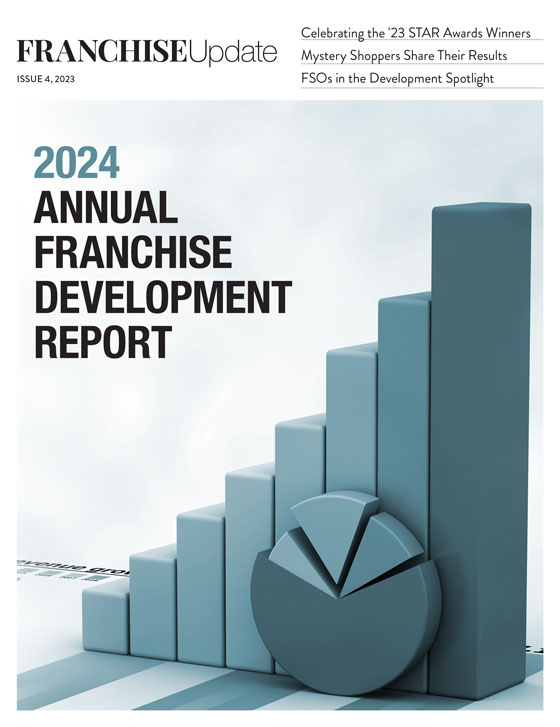Mystery Shopping 2023: Annual Study Once Again Finds Room for Improvement in Franchise Recruiting

As economic headwinds affect the industry, it’s more important than ever for franchise brands to do the little things that attract new franchisees to their systems.
“We hear a lot from development people that qualified leads of people who are really looking to start a business aren’t as plentiful as they are in different economic environments,” says Jayson Pearl, president of ServiceScore and one of the researchers in this year’s Mystery Shopping study.
Something as simple as returning a phone call or directing a social media link straight to the franchise development website can provide the information prospects need. “Salespeople need to take the extra time to set themselves apart by being extra-responsive to somebody who raises their hand, saying, ‘I’m interested in your brand,’” Pearl says. “Those leads are definitely few and farther between.”
Franchises have a variety of tools to advance their franchise development goals, including phone calls, online forms, websites, and social media. Brands that pre-registered for the 2023 Franchise Leadership & Development Conference were eligible to have teams of mystery shoppers test how well the organizations used their tools.
Pearl was joined by fellow mystery shoppers, Graham Chapman and Jessee Leili-Jones with 919 Marketing Company and Dawn Kane and Jacquie Rooney with Hot Dish Advertising.
Once again, researchers found weak links in brands’ recruiting efforts and suggested best practices to use going forward.
Telephone shop
In the era of chatbots and automatic messages, there’s still room for the old ways. The telephone remains an important tool for discussing issues back and forth in real time. Rather than trying to figure out what a line in an email means, parties on the phone can ask for clarification and receive immediate feedback.
Pearl created a “prospect” named Jennifer Townsend. The fictional character’s job was to learn more about how to become a franchisee with each brand. The telephone was her tool for the mystery shop, which spanned Sept. 5–14.
“They’ve already read the information about the brand online,” Pearl says, “and something specific prompted them to say, ‘I want to talk to somebody more about this opportunity.’”
Turns out that only 62% of brands surveyed had phone numbers available on their franchise development websites in 2023. That’s a drop from 2022, when the number was 71%.
The next step was to start making calls:
- 77% went to voicemail.
- 8% were answered by a person who could help.
- 8% were answered by someone who took a message.
- 7% received no answer and no voicemail.
This year, 61% of brands returned the calls from voicemail within 24 hours. “Taking a second to do a phone call back, especially when somebody calls, makes the most sense,” Pearl says. “Many of the brands are doing that and are very responsive.”
However, 39% did not return a call at all. Last year, nearly 30% of brand representatives did not return a prospective franchisee’s call. The no-call rate is puzzling in the current economic environment when franchise development professionals report that qualified leads are difficult to find.
“It’s an interesting insight in a world where there’s still a lot of competition for great leads,” Pearl says. “This is a somewhat challenging time for franchise development because you have a pretty good economy, a low unemployment rate, people aren’t leaving their jobs, they’re not getting laid off, and access to capital is challenging because of interest rates and other things.”
Though the mystery shop was for the telephone, the brands often responded to queries with texts or emails. Pearl says that could be an outgrowth of the trend toward automating as many processes as possible.
“There’s definitely a follow-up, but I think what we’ve heard in the past remains true: You want to still be able to be responsive in all the ways that somebody might want to communicate with a brand,” Pearl says. “That might be to email back and forth. It might be to text. It might be to use a chatbot. But it might also be a telephone.”
Website inquiry submission
While the fictional Jennifer Townsend was making phone calls and waiting to hear back, the fictional Steve Turner, also created by Pearl’s team at ServiceScore, was going online, filling out franchise development forms, and tracking the response times from a qualifier or recruiter. The results were not as robust this year as they were last year:
- 31% of brands called back within 24 hours. Last year, it was 38%.
- 22% called within 4 hours. In 2022, it was 31%
- 41% percent called back at some point. In 2021 and 2022, 55% of brands called back.
- 19% did not respond in any way, including call, text, or email.
Overall, 82% of brands surveyed sent emails or texts in response to the fictional prospect’s query. That represents a drop of 6% from last year.
Because prospects reach out digitally with an online form, the process relies heavily on automation. That creates opportunities and cost savings for franchisors when done right and potential problems when things go wrong. “One of the downsides with that is when the online form isn’t integrated with the CRM system or the specific calendar of that salesperson,” Pearl says. “Sometimes those would be out of sync.”
In such cases, the fictional prospect was left waiting for a call that never came because the salesperson didn’t know they were supposed to make it. In other cases, technological disconnects led to confusing texts or emails about an upcoming call that had already happened.
“Automation can be good, but one negative that you saw with automation was the number of no-shows,” Pearl says. “In terms of responsiveness and follow-up, there were fewer mistakes in terms of no-shows when it was human to human.”
Recruiters were better at showing up for scheduled calls in 2023 than they were a year ago. This year, 18% missed scheduled calls compared to 21% in 2022. “This is the first impression of the brand. You’re establishing trust,” Pearl says. “There are so many brands that pride themselves on their support, culture, technology, infrastructure, and innovation. If the candidate is let down in those areas in this first impression, they’re not going to trust you.”
In addition to tracking responses, the fictional Steve Turner was tasked with assessing the calls he received. Did the recruiter provide a good candidate experience and share what was unique about the brand?
According to the mystery shop, 18% of brands responded within 24 hours of initial contact and shared at least one differentiator. “For the brands that are responsive, it’s part of their culture and probably their leadership that they do really well,” Pearl says. “There are some brands that we know are growing year after year and are expanding. It’s no secret that they have high response rates, and their recruiters do a great job of connecting and sharing differentiation.”
Website shop
In franchise development, a website is a modern-day brochure without a page limit. It’s also an open invitation for prospective franchisees to begin to see if a brand is right for them. Jessee Leili-Jones, senior vice president for digital services, and her team at 919 Marketing Company investigated 134 websites for different brands.
“We utilized the insight reports we create for our clients, our key findings report,” she says. “It’s what our teams use to analyze our clients’ and prospective clients’ sites.”
They looked at four categories and weighted them for importance:
- Core features (10%)—a unique URL, top 10 SE rank, and a unique starting point
- SEO readiness (25%)—includes word “franchise” in the title and industry keywords in the title description, and has open graph tags
- Website usability (15%)—has cookie consent, privacy policy, secure website, video, visible contact information in the footer, clear CTAs, and ADA compliance
- Key content (50%)—features a dedicated about page, benefits of franchising, benefits of company franchise, maps, investment charts, FAQs, testimonials, industry background, earnings claims, franchise award process, active posting of new content, and disclosure of buildout, royalty, and franchise fee requirements
The researchers rated content the highest because it contains the information a prospective franchisee would want to have before making a decision. “We did a whole overview at a high level of what was initially available for the people who went to the site,” Leili-Jones says. “Was the content they needed to find there? Was it easy to find? Was it engaging enough for someone to be interested enough to go deeper into the site?”
They found numerous aesthetically pleasing and easy-to-use sites that didn’t have the information a prospective franchisee would need. “Even though they might be beautiful, they didn’t have any content that’s of value,” Leili-Jones says. “We had to take all of that content into consideration and weight that heavier.”
She reported some sites did well during the website mystery shop. However, her team’s research found room for improvement. For instance, 62 of 134 sites (46%) actively posted new content, including blogs and news releases. “Somebody’s going to beat you out because they have a strong organic strategy and a digital or backlinking strategy, so they have articles out,” she says. “They have PR. They have earned media that is linking to their site.”
In some areas, there were drop-offs when compared to the previous year’s results:
- Only 39 (29%) had some sort of earnings claims compared with 30% in the 2022 survey.
- Only 58 (43%) featured accessible investment information. Last year’s participants included investment charts 49% of the time.
From a 10,000-foot view, emerging brands did a better overall job of hitting all four categories than legacy brands did. “I was surprised by the lack of information that some of the larger brands might provide,” Leili-Jones says. “It might have been a beautiful site, and it was aesthetically pleasing, but when we ran the numbers, it didn’t align with what a smaller brand might have had. It was interesting for me to see the differences. You’d think a huge brand name would have everything, and they’re not even ADA compliant.”
Graham Chapman, president of 919 Marketing Company, says design and brand standards are always subjective, but there are best practices that affect recruiting efforts. “When it comes down to it, it’s not just our opinion but based on what attracts people to websites, what drives traffic and drives conversions,” he says. “Did the website do its job to deliver the information that people were searching for? That is always going to be our baseline barometer.”
Social media
According to Statista, approximately 4.9 billion people from around the world use social media in 2023. That number was backed up by Forbes, which added that “the average person spends about 145 minutes a day on social media.” Forbes also reported that 77 percent of businesses use social media to connect with their customers, and 90 percent of users follow at least one brand on social media. That’s a lot of eyeballs looking at phones, wanting to be engaged.
“We hear this all the time: ‘That’s not where my audience is. They’re never going to buy a brand off of Facebook,’” says Dawn Kane, CEO and co-founder of Hot Dish Advertising. “We know firsthand that’s not true. We’ve sold multi-packs of million-dollar investment brands, and the leads came directly from Facebook.”
According to the Forbes article, Facebook has 2.9 million monthly visitors while Instagram has 2 million. Kane and her colleague, Jacquie Rooney, account coordinator for Hot Dish, spent a few weeks exploring the Facebook and Instagram posts of franchise brands. The goal was to see how companies used social media to further their franchise development. “I don’t think anyone got an exact, perfect score,” Rooney says, “but there were brands that scored pretty high.”
The companies that scored well posted organic content on social media at least three times a week. They provided authentic voices that connected with users in unforced ways. In addition, their posts contained links that took potential franchisees directly to a franchise development portal where they could learn all about the brand that had captured their eyes.
“If they are putting in the time to go wherever that ad or organic post is driving folks,” Rooney says, “they should get relevant content when they get there as opposed to having them land in a particular place and hope that they find what they’re looking for.”
However, not all brands have their social media links operating in smooth, working order. In a handful of cases when mystery shoppers clicked on a call to action, it didn’t take them to a franchise development site, so the franchise sales funnel couldn’t be engaged.
“Some brands would run ads and then users would go to the website,” Kane says, “but it wasn’t telling them the same thing the ad said, so it was a disconnect when they got there.”
Overall, emerging brands had stronger social media marketing than legacy brands. In some cases, large brands didn’t have or didn’t use their own franchisor social media accounts, but their franchisees had individual accounts for their stores.
“A lot of smaller brands do franchise appreciation days,” Rooney says, “and they will talk about what they’re doing with different franchises at different locations.”
During their mystery shopping experience, the team at Hot Dish saw room for improvement when using paid ads to reach out to potential franchisees:
- 20% of brands used retargeting ads.
- 20% ran franchise development ads.
- 10% used video or GIFs in their ads.
“With bigger brands, they didn’t post very much about franchise development,” Rooney says, “and sometimes you wouldn’t know that they were a franchise because they would post mostly consumer ads.”
When marketing with social media, it’s important to be authentic and relevant, Kane says. Corporate silos can get in the way of that while emerging brands might not have as many layers of oversight.
Though some corporate clients don’t see the value in a robust social media campaign, Kane says there are clear reasons to post engaging content about franchise development on Facebook, Instagram, and other platforms.
“You want to show up where your prospects are even if they don’t know they’re looking for a business opportunity,” Kane says. “They’re just scrolling their feed when they come across it and see it. They may not click on it, but they’re going through their feed a week later and they see it and they see it and they see it. Eventually, they say, ‘I need to learn more about this business because it shows up everywhere I go.’”

Best Practices
Small improvements add up over time. If you’re not seeing the franchise development results you want, consider adding simple steps to boost your team’s effectiveness.
- Return a phone call with a phone call.
- Every prospect appreciates a quick reply.
- In addition to a customer-facing website, make sure you have a site devoted to franchise development.
- Train your sales team to provide brand differentiators when talking to a new prospect.
- If you’re using AI, make sure it fully aligns with your salespeople’s calendars.
- Remember that content is king, so provide engaging blogs, GIFs, and videos to catch attention.
- Test all web links to ensure they take prospects where you want them to go.
- Make sure social media posts are authentic to the brand.
- Aim for three posts a week on social media.
- Try to see your development efforts the way a prospect would see them.
- Do your own mystery shop to learn exactly what’s working and what’s not.
Share this Feature
Recommended Reading:
Comments:
comments powered by DisqusFRANCHISE TOPICS
- Multi-Unit Franchising
- Get Started in Franchising
- Growth
- Operations
- Open New Units
- Leadership
- Marketing
- Technology
- Legal
- Awards
- Rankings
- Trends
- Featured Franchise Stories
FEATURED IN

Franchise Update Magazine: Issue 4, 2023






 The franchise listed above are not related to or endorsed by Franchise Update or Franchise Update Media Group. We are not engaged in, supporting, or endorsing any specific franchise, business opportunity, company or individual. No statement in this site is to be construed as a recommendation. We encourage prospective franchise buyers to perform extensive due diligence when considering a franchise opportunity.
The franchise listed above are not related to or endorsed by Franchise Update or Franchise Update Media Group. We are not engaged in, supporting, or endorsing any specific franchise, business opportunity, company or individual. No statement in this site is to be construed as a recommendation. We encourage prospective franchise buyers to perform extensive due diligence when considering a franchise opportunity.